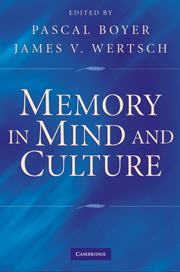Book contents
- Frontmatter
- Contents
- List of Contributors
- PART I IN MIND, CULTURE, AND HISTORY: A SPECIAL PERSPECTIVE
- PART II HOW DO MEMORIES CONSTRUCT OUR PAST?
- PART III HOW DO WE BUILD SHARED COLLECTIVE MEMORIES?
- PART IV HOW DOES MEMORY SHAPE HISTORY?
- 9 Historical Memories
- 10 The Memory Boom: Why and Why Now?
- 11 Historians and Sites of Memory
- PART V HOW DOES MEMORY SHAPE CULTURE?
- Index
- References
9 - Historical Memories
Published online by Cambridge University Press: 05 June 2012
- Frontmatter
- Contents
- List of Contributors
- PART I IN MIND, CULTURE, AND HISTORY: A SPECIAL PERSPECTIVE
- PART II HOW DO MEMORIES CONSTRUCT OUR PAST?
- PART III HOW DO WE BUILD SHARED COLLECTIVE MEMORIES?
- PART IV HOW DOES MEMORY SHAPE HISTORY?
- 9 Historical Memories
- 10 The Memory Boom: Why and Why Now?
- 11 Historians and Sites of Memory
- PART V HOW DOES MEMORY SHAPE CULTURE?
- Index
- References
Summary
After the attacks on the World Trade Center and Pentagon on September 11, 2001, the Princeton historian Bernard Lewis explained the thinking and behavior of Muslims to the American public in a New Yorker article (Lewis, 2001). Lewis wrote that, unlike Americans, Muslims know and care about history:
In current American usage, the phrase “that's history” is commonly used to dismiss something as unimportant, of no relevance to current concerns. … Middle Easterner's perception of history is nourished from the pulpit, by the schools, and by the media, and although it may be – indeed, often is – slanted and inaccurate, it is nevertheless vivid and powerfully resonant. (p. 51)
Lewis implies that Americans' (and presumably most Westerners') historical memories are not “nourished from the pulpit, by the schools, and by the media.” He further implies that Americans' historical memories are accurate, even if they do not care much about history.
In this chapter, we dispute each of these claims. Muslims are not unique in their use or abuse of history. People's memories of the histories of the national, ethnic, or religious groups to which they belong (ingroups) are often tilted in favor of their ingroups and against other groups. We present evidence that historical memories are skewed, in part, because children and adults are presented with selective and biased depictions of the past. Educators, religious leaders, politicians, and media all play an important role by influencing the knowledge available.
- Type
- Chapter
- Information
- Memory in Mind and Culture , pp. 223 - 237Publisher: Cambridge University PressPrint publication year: 2009
References
- 7
- Cited by



